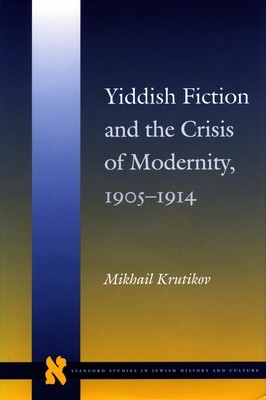
- We will send in 10–14 business days.
- Author: Mikhail Krutikov
- Publisher: Stanford University Press
- ISBN-10: 0804735468
- ISBN-13: 9780804735469
- Format: 16.2 x 23.6 x 2.1 cm, kieti viršeliai
- Language: English
- SAVE -10% with code: EXTRA
Yiddish Fiction and the Crisis of Modernity, 1905-1914 (e-book) (used book) | bookbook.eu
Reviews
Description
This book examines representations of modernity in Yiddish literature between the Russian revolution of 1905 and the beginning of the First World War. Within Jewish society, and particularly Eastern European Jewish society, modernity was often experienced as a series of incursions and threats to traditional Jewish life. Writers explored these perceived crises in their work, in the process reconsidering the role and function of Yiddish literature itself.
The orientation of nineteenth-century Yiddish fiction toward the shtetl came into conflict with the sense of reality of young writers, who felt themselves part of a rapidly changing modern urban environment. This opposition between the generations was reflected in their principles of plot construction. The conservatives employed cyclical patterns, producing mythological schemes for incorporating the new experience into the traditional order. Modernists emphasized the uniqueness of the new, and therefore preferred a linear organization of plot with emphasis on the transformation of individual character.
The texts under discussion (primarily novels and novellas) are analyzed with respect to the way they represent different aspects of the modern world: economic change, revolutionary politics, emigration, and the emancipation of women. The author's methodology draws upon a variety of semiotic, structuralist, and psychoanalytic approaches, informed by insights derived from the Soviet Marxist tradition.
The writers treated in the book include the classical figures Sholem Aleichem and Y. L. Peretz, their lesser-known contemporaries Yankev Dinezon, Mordkhe Spektor, and S. Ansky, younger authors from Russia and Poland, including Sholem Asch, David Bergelson, and Itche-Meir Weissenberg, and the American Yiddish writers Leon Kobrin, David Ignatov, Joseph Opatoshu, Isaac Raboy, and Morris-Jonah Haimowitz.
EXTRA 10 % discount with code: EXTRA
The promotion ends in 21d.20:50:12
The discount code is valid when purchasing from 10 €. Discounts do not stack.
- Author: Mikhail Krutikov
- Publisher: Stanford University Press
- ISBN-10: 0804735468
- ISBN-13: 9780804735469
- Format: 16.2 x 23.6 x 2.1 cm, kieti viršeliai
- Language: English English
This book examines representations of modernity in Yiddish literature between the Russian revolution of 1905 and the beginning of the First World War. Within Jewish society, and particularly Eastern European Jewish society, modernity was often experienced as a series of incursions and threats to traditional Jewish life. Writers explored these perceived crises in their work, in the process reconsidering the role and function of Yiddish literature itself.
The orientation of nineteenth-century Yiddish fiction toward the shtetl came into conflict with the sense of reality of young writers, who felt themselves part of a rapidly changing modern urban environment. This opposition between the generations was reflected in their principles of plot construction. The conservatives employed cyclical patterns, producing mythological schemes for incorporating the new experience into the traditional order. Modernists emphasized the uniqueness of the new, and therefore preferred a linear organization of plot with emphasis on the transformation of individual character.
The texts under discussion (primarily novels and novellas) are analyzed with respect to the way they represent different aspects of the modern world: economic change, revolutionary politics, emigration, and the emancipation of women. The author's methodology draws upon a variety of semiotic, structuralist, and psychoanalytic approaches, informed by insights derived from the Soviet Marxist tradition.
The writers treated in the book include the classical figures Sholem Aleichem and Y. L. Peretz, their lesser-known contemporaries Yankev Dinezon, Mordkhe Spektor, and S. Ansky, younger authors from Russia and Poland, including Sholem Asch, David Bergelson, and Itche-Meir Weissenberg, and the American Yiddish writers Leon Kobrin, David Ignatov, Joseph Opatoshu, Isaac Raboy, and Morris-Jonah Haimowitz.


Reviews